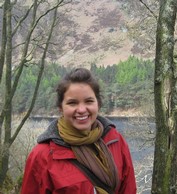STILLPOINT Archive: last updated 12/05/2012
By Sophia Buchanan '11
Wanderlust has afflicted me lifelong, and it always strikes with a predilection for Germany. I came down with one acute bout of the condition in 2011, my first year as a Gordon graduate, during which I worked as a Fulbright Teaching Assistant in the German public school system.
This teaching grant placed me in a secondary school in the small town of Ingelheim am Rhein. Ingelheim once housed Charlemagne’s imperial court, a historical peak which was proudly commemorated in the name of my school. Called the Kaiserpfalz Realschule, it is a fifth- to tenth-grade school with a diverse student body. Many of my students were immigrants to Germany, mainly from the Middle East and former Soviet bloc Europe. Most of the classes I taught were composed of two main socioeconomic groups: European students from socially liberal families (often dubbed “post-Christian Europeans”), and Turkish students from moderate Muslim families. In this sense, my classes were a microcosm of the demographics of modern Germany.
Fulbright Teaching Assistantships are granted based in part on the cross-cultural enthusiasm of the applicant; prior teaching experience (or lack thereof) is of minor consideration. This means that when a Fulbright ETA is sent forth to command the tenth grade through the rigors of conditional clauses under the topic of “The drinking age in Germany,” she must quickly learn to adjust her lesson plan to conditional clauses, the drinking age, and the religious fervor of her 16-year-old Muslim students. It also means that when a Fulbright ETA chaperones the seventh grade on a trip through the United Kingdom, she must learn that clarity of communication with this particular age group has vastly more to do with an obey-me-or-suffer-my-wrath stare than it does with the proper declension of German adjectives.
Coming from the USA and endorsed by Fulbright, I was prepared to openly discuss my culture with the inquisitive German psyche which seems to be ingrained in many residents of that nation. Daily I was questioned on politics, social issues, environmental issues and more. Having lived in Germany before, I was armed with an arsenal of witty responses with which to tackle such questions. What I was not expecting was that my calling to represent Christ and the culture of Christianity would far overtake my task of representing American culture. Throughout the year, as I grew closer to my colleagues and students, the topic of “American” evangelicalism as juxtaposed with the transcendent culture of my Christian belief came up in conversation time and time again.
Those conversations were respectful and meaningful, thanks to my undergraduate education at Gordon. At Gordon I learned to speak on a culturally-informed level and to cherish faith questions as a means of understanding the greatness of Christ. My Fulbright assignment gave me the opportunity to enter into an experience of cross-cultural development. Gordon equipped me to engage in discussions about faith, and to grow in my understanding of Christ’s compassion as an entity that is wholly separate from any nation or culture.
Sophia Buchanan graduated with a German major and an English minor. She was awarded a Fulbright English Teaching Assistantship (ETA) to Germany, where she taught for the 2011–2012 academic year.
[email protected]
